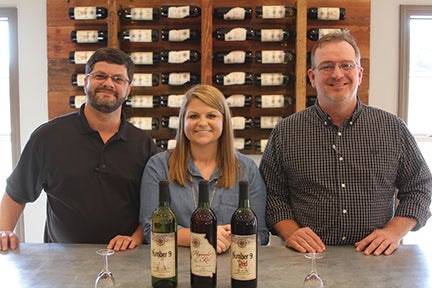Local winery reaches fruition
Published 12:25 pm Saturday, November 26, 2016

- From left are owners and staff of Wolf Creek Vineyard and Winery, Matt Johnson, Haley Johnson, and Phillip English.
By MICHAEL MURRAY
AMERICUS – After nearly three years of preparation, Sumter County’s first and only winery has finally opened its doors to the public. Owned by local business partners, Matt Johnson and Jerry English, the Wolf Creek Vineyard, located at 207 Wolf Creek Drive in rural Sumter County, recently completed the bottling of its first batch of three different types of wines and began making them available for purchase on site on Nov. 11.
In the last year, since the Times-Recorder initially reported on the burgeoning vineyard and winery, the space has undergone many changes — the most obvious of which is evidenced upon approaching the plantation.
Along the winding Wolf Creek Drive, visitors are treated to a view of the lakeside vineyard, abundant with lush grapevines. Upon reaching the retail space, which previously served as the clubhouse for the former Wolf Creek Plantation Golf Course, visitors are greeted by a friendly staff and a shelf, containing hundreds of bottles of wine contained in the building, the interior of which sports a casually rustic décor.
A trio of offered libations, dubbed “Mapmaker Red”, “Number 9 Red”, and “Number 9 White”, offer a variety of experiences for a variety of different palates, ranging from semi-dry to sweet table wines.
The names of the different wines contain references to Johnson’s and English’s other professions, as well as a subtle nod to the history of the vineyard, itself. “Mapmaker Red” refers to the duo’s experiences as land surveyors, while both varieties of the “Number Nine” refer to the location of the grapevines in which the grapes used to create the vines were grown. Both the bronze and the red grapes used to create “Number 9” beverages are grown on the portion of the vineyard that was once the fairway of the ninth hole of the golf course that previously occupied the space.
Johnson, the vineyard’s co-owner, spoke with the Times-Recorder shortly after the opening to discuss the new business.
Asked about the process of actually making the wine, Johnson told the Times-Recorder that there was a bit of a learning curve in the beginning. He stated that the team initially created several batches, testing different methods of production with assorted grapes, as well as different fermentation temperatures and yeast strains until they reached the ideal recipe for the drink that they wanted to produce.
“Our goal, in the beginning, was just to find something that worked … ” Johnson said.
“We also learned a lot about how not to make wine,” he joked. “But we had some recipes that we really liked and that’s what’s in these bottles now.”
After many test runs and countless hours of research, including attending seminars on winemaking, the team eventually determined the three types they would go on to create on a large scale.
Once the recipes were perfected, Johnson, English, and their employees went into large-scale production.
Johnson went on to say that, aside from just growing the muscadines on the premises, the rest of the fermenting and bottling process takes place at the vineyard as well. On a brief tour of the facility, he told the Times-Recorder that every step of the process is conducted onsite, from processing the fruit through a hand-powered crusher to the bottling and sealing … even the labels on the bottles are applied on the premises.
Johnson stated that they are preparing to offer another dry wine that is not quite ready for consumption, currently.
“They take a little longer to produce. They need to be aged and treated,” he said. “Later on, we plan to produce a lot more different wines.”
After purchasing the land in 2013, the duo planted seven acres before they ever made a drop of wine.
“We were sure hoping we could do it successfully,” Johnson joked. “Last year, we made our first batches of wine. It was very experimental. We were very meticulous in our methods … We wanted to create a wine that was very similar to the grape from which it comes. One of the compliments that we often get on one of the wines, the Number 9 White, is that it tastes exactly like a muscadine. That’s what we wanted. We didn’t set out to make wines that you feel like you have to put on a suit and tie to drink. We didn’t want to make wines that only a select group of people would be interested in. Our goal is to make a good, southern wine that appeals to a lot of people, even people that don’t normally drink wine. We get that compliment a lot. People will come in the store and say, ‘Well, I don’t want to taste any. I don’t drink wine.’ When they do taste it, they’ll say, ‘Wow, I really like that.’ So it’s a different experience … We wanted to make our own product … and we want that product to be one that the people around here, in Sumter County, can be proud of and that we’re proud of.”
“People love it,” Johnson concluded. “I think that they like the idea that this is here in Sumter County and they don’t have to go to elsewhere … I think the nearest one is south of Albany and there are others in Tifton and Warm Springs in the Columbus area.”
The retail space offers a variety of other products as well, sourced from locations around South Georgia, including t-shirts printed in Americus, cheese from Sweet Grass Dairy in Thomasville, as well as an assortment of handmade muscadine jams and syrups from Blackberry Patch, also located in Thomasville.
Construction of an outdoor seating area is currently underway, on which visitors will soon be able to enjoy the view while imbibing their refreshing purchases.
Currently, the vineyard encompasses nearly 12 acres, containing 1,400 vines, growing nine different varieties of muscadine.
“This year, the vineyard produced around 9,200 bottles of wine,” Johnson said. “Our oldest vines are in their third summer, so they’re at about half of their potential production. In the fourth summer, they’ll be at full production.”
Johnson estimated that, next year, the vineyard should be capable of producing around 25,000 bottles and, the following year, production is expected to reach around 40,000 bottles.





